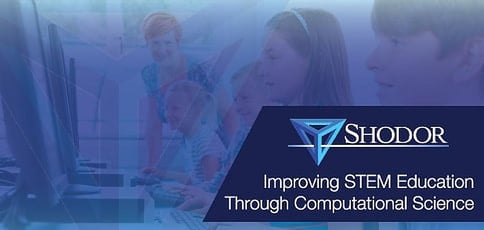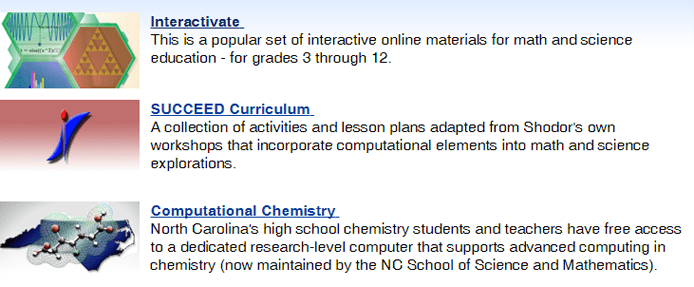
TL; DR: Founded more than 20 years ago with a mission to improve STEM education through computational science, Shodor has been connecting students and educators with resources to help them succeed in the modern world. Through modeling and simulation technologies, workshops, and other hands-on experiences, Shodor nurtures the development of highly marketable skills in demand in today’s workplace. The nonprofit provides direct training and tools instructors can employ to teach STEM curricula in more dynamic ways. And, with volunteer opportunities for the IT industry’s best and brightest to give back, Shodor is sure to continue its efforts well into the future. //
In the early 1990s, Robert Panoff, a professor at the University of Illinois, was given only a few weeks to live after being diagnosed with a rare form of kidney cancer. When he awoke from a successful, life-saving surgery, Robert decided he didn’t want to spend his time on earth doing research and pooling grant money from the university. Instead, he wanted to make a more direct impact on the world. So he changed direction, deciding to teach students about STEM through computational science and, thus, founded Shodor.
“He and his colleagues got together, formed a board, and started Shodor with simply a PO box and an idea to transform STEM education,” said Levi Diala, Shodor’s Associate Director. “Ever since, Shodor’s grown to be a national resource for computational science education.”
Fortunately, as it turned out, Robert’s initial diagnosis was a bit off. He’s alive and well today and has witnessed countless students and educators benefit from the nonprofit he began.

Dr. Robert Panoff founded Shodor 20 years ago to improve STEM education through computational science.
For more than 20 years, Shodor has been providing educational resources and hosting workshops for students and instructors with the goal of improving education using computational science. Through modeling and simulation technologies, the nonprofit presents STEM curricula with an interactive and dynamic approach that’s easily digestible.
Shodor was built so curious minds could learn about computational science and its practical applications in STEM fields — including building simulations, scientific illustrations, and innovative design. The organization continues Robert’s vision of preparing a new generation for the world of future science and technology.
A Mission to Improve STEM Education Through Computational Science
Science, technology, engineering, and mathematics (STEM) are the fastest growing fields of our time. And Shodor recognizes computational science as one of the most effective ways to improve how educators present and students learn in these areas.
“We strive to improve math and science education through the use of computational science using computer modeling and simulation technology,” Levi said. “We do that through a number of ways.”
Levi told us Shodor’s online curriculum, called Interactivate, is free to use for K-through-12 students. Throughout the curriculum, there are 144 different applets to enable students to learn math- and science-related concepts on their own.

Shodor views computational science as one of the most effective ways to present STEM curricula.
“There’s also an educator side to our resources,” he said. “Teachers can use it in the classroom, and it includes assisting questions that promote critical thinking.”
Shodor helps students and instructors both directly and indirectly — providing hands-on learning in addition to the myriad of computer simulations, interactive models, and other virtual tools.
Shodor partners with NCSI and NCSA to provide ways for educators to incorporate computational science into existing curricula. The organization also provides direct internships and apprenticeships to students from the middle school through the undergraduate level.
Helping Students Develop Marketable Skills for Future Career Paths
The lessons involved with computational science and STEM fields help students build problem-solving, social networking, and visualization skills, which are highly marketable in the contemporary workplace.
Lessons include parallel computing, model building, and web design. According to Levi, Shodor’s internship program is effective in connecting students with evolving industries so they will be prepared for the future.

Shodor’s team develops online resources students in grade school to college can access for free.
“We coordinate internships for undergrads researching supercomputers and help students connect to mentors at their own universities,” he said.
The nonprofit fosters real-world skills to prepare students for a world where STEM and computational science are increasingly important. It does that through the following programs:
- SUCCEED Workshops: STEM classes for middle and high school students
- Apprenticeships: A beginning program nurturing career development
- Internships: Interns help develop the materials used in future lessons
- Pathways to CyberInfrastructure: Hands-on summer and afterschool program
- Computing MATTERS: Fostering interest in computing
Shodor seeks to not simply spark interest but to actually engage students in learning. As part of their work, students complete a web portfolio. Finished projects are often shared on the site for future classes to use as teaching materials. As Levi told us, the immediate impact of their work helps encourage students, which further cultivates interest in STEM and computational science.
Educator Program Builds Knowledge Bank and Pedagogical Effectiveness
Shodor helps schools incorporate computer-based learning into their curriculum to increase pedagogical effectiveness.
“For college faculty, we do a number of campus visits every year,” Levi said. “If these educators are able to gather interest in some area where computational science might benefit their teaching — whether that be biology, chemistry, physics, or earth science — we’re happy to set up a workshop for them.”

Computing MATTERS provides teachers training and tools to incorporate computing in their classrooms.
Shodor’s educator workshop, Computing MATTERS, helps local teachers integrate computing into their classrooms and afterschool programs. Shodor provides direct training to teachers, as well as tools to use in the classroom, including models for dynamic geometry, algebra, and data analysis, among others.
Shodor partners with the National Computational Science Institute to offer courses related to computational science such as computational chemistry and atmospheric science. These can easily be combined with a typical science class through the use of atmospheric and chemical diagrams, equations, and air quality monitoring. The workshops can range from introductory to advanced and are offered across the country.
How IT Industry Pros Can Give Back Through Donations & Volunteering
As with most nonprofits, Shodor accepts assistance through financial donations. However, established technology professionals can also give back by offering their expertise.
“For the apprenticeship program, we have a lot of guest lecturers come in and speak with groups over the course of the year of the program,” Levi said. “They’ll talk to them about their specific experience working in their industry, tell them about the role of computers in their field, and discuss the approaches to computer programming they take in their professional lives.”
Levi noted another way to get involved in helping Shodor’s efforts is through hardware donations. Though they’re primarily a Mac-based enterprise, Shodor tests against all types of equipment, so most any hardware donation is welcomed.
“We’re always on the lookout for new hardware,” he said. “Donating hardware and expertise are the ways these professionals can make an immediate impact.”
Shodor has come a long way since its inception in the early 1990s. Now that STEM fields have become so prevalent, the nonprofit is proving to be a valuable resource used by millions of people each month. Dr. Panoff recognized the value computational science could bring to STEM 20 years ago, and Shodor is realizing that vision every day.
HostingAdvice.com is a free online resource that offers valuable content and comparison services to users. To keep this resource 100% free, we receive compensation from many of the offers listed on the site. Along with key review factors, this compensation may impact how and where products appear across the site (including, for example, the order in which they appear). HostingAdvice.com does not include the entire universe of available offers. Editorial opinions expressed on the site are strictly our own and are not provided, endorsed, or approved by advertisers.
Our site is committed to publishing independent, accurate content guided by strict editorial guidelines. Before articles and reviews are published on our site, they undergo a thorough review process performed by a team of independent editors and subject-matter experts to ensure the content’s accuracy, timeliness, and impartiality. Our editorial team is separate and independent of our site’s advertisers, and the opinions they express on our site are their own. To read more about our team members and their editorial backgrounds, please visit our site’s About page.

